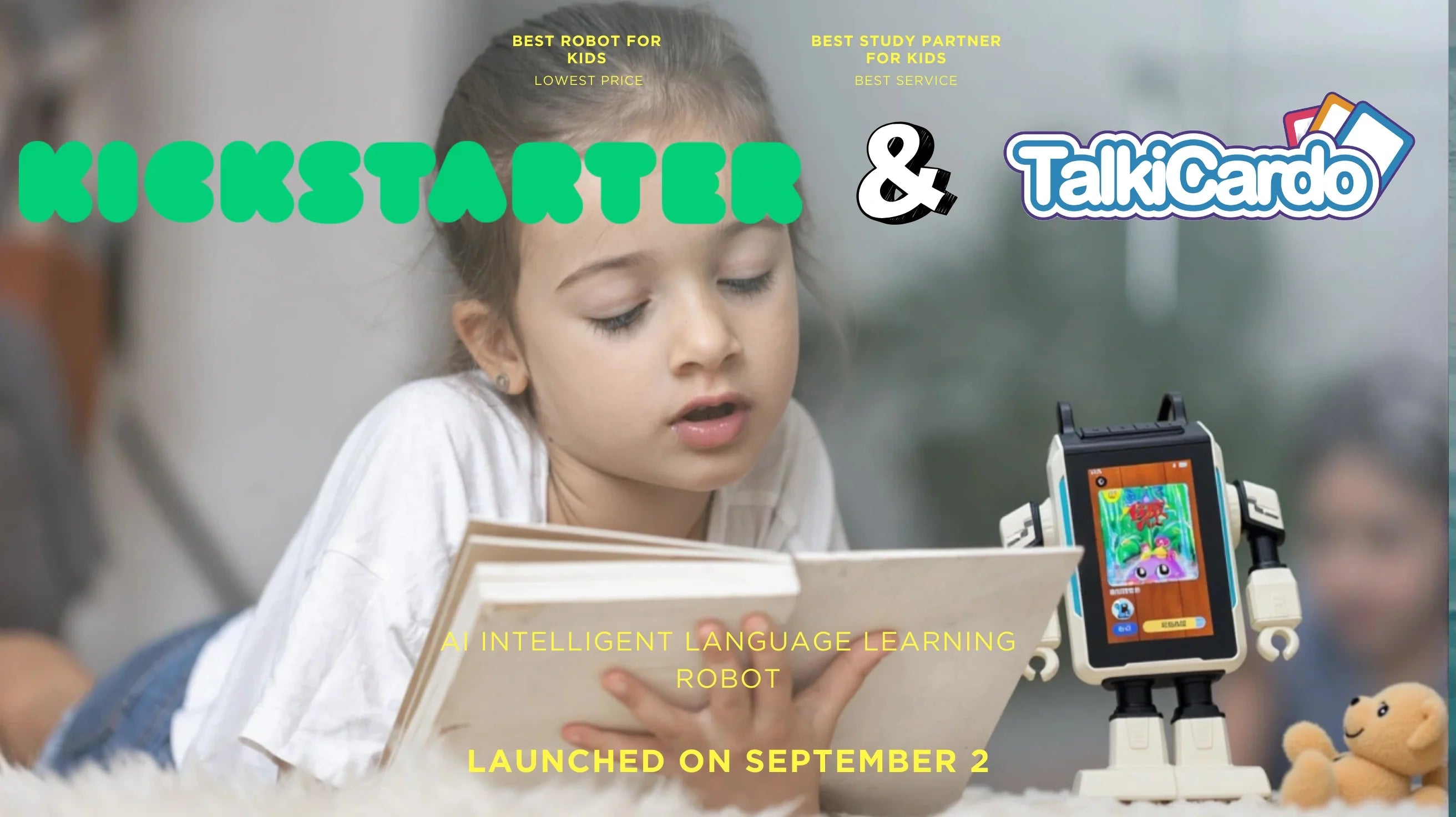
Master 30% of PSLE Score in Just 15 Minutes Daily: TalkiCardo's Oral Language Workout Plan
Posted by Aipilot on
Table Of Contents
- Understanding the PSLE Oral Examination: The 30% That Matters
- Common Challenges Singaporean Students Face in Oral Communication
- Introducing TalkiCardo: Your Child's AI-Powered Speaking Partner
- The 15-Minute Daily Oral Workout Plan: Breakdown and Benefits
- Tracking Progress: How to Measure Improvement
- Parent-Teacher Collaboration: Supporting Oral Skills Development
- Real Success Stories: How Students Improved Their PSLE Scores
- Frequently Asked Questions
Every Singaporean parent knows that PSLE preparation is no small feat. With the intense competition and high expectations, finding effective learning strategies becomes crucial. But here's something many parents overlook: a full 30% of your child's PSLE English score comes from the oral examination alone! That's nearly one-third of the total marks resting on your child's speaking abilities.
What if there was a way to significantly improve this substantial portion of the PSLE score with just 15 minutes of focused practice daily? That's exactly what we've developed with TalkiCardo's Daily Oral Workout Plan – a structured, engaging approach that transforms how children practice and master oral communication skills.
In this article, we'll reveal how TalkiCardo, our AI-powered Smart Chat Cards for Kids, creates a consistent, supportive environment for oral language development. Whether your child struggles with pronunciation, vocabulary recall, or confidence in speaking, our 15-minute daily routine could be the game-changer you've been searching for in their PSLE preparation journey.
Master the 30% of PSLE English Score
with just 15 minutes of daily oral practice
30% of PSLE Score
The oral examination makes up nearly one-third of the total PSLE English score
AI-Powered Practice
TalkiCardo provides personalized feedback on pronunciation, grammar, and vocabulary
15-Minute Daily Oral Workout Plan
Minutes 1-3
Warm-Up Reading
Practice pronunciation, pacing, and expression with guided passages
Minutes 4-12
Interactive Conversation
Engage with AI characters on various topics to build vocabulary and critical thinking
Minutes 13-15
Reflection and Review
Receive feedback on strengths and specific areas for improvement
Common Oral Challenges TalkiCardo Addresses
Limited Speaking Opportunities
Confidence and Anxiety Issues
Multilingual Environment Challenges
Lack of Immediate, Constructive Feedback
Benefits of Consistent Practice
Spaced Repetition
Short daily sessions for better retention
Deliberate Practice
Focused improvement on specific areas
Consistency Building
Daily habits lead to cumulative improvement
Transform your child's PSLE oral skills with just 15 minutes a day
Understanding the PSLE Oral Examination: The 30% That Matters
The PSLE English Language oral examination consists of two main components: Reading Aloud and Stimulus-based Conversation. Together, these components account for 30 marks out of the total 100 for English Language, making oral skills a critical factor in your child's overall performance.
In the Reading Aloud section, students must demonstrate clear pronunciation, appropriate intonation, and expressive delivery of a given passage. The examiner looks for fluency, accuracy, and natural pacing – skills that develop through regular practice and feedback.
For the Stimulus-based Conversation, students engage in a discussion with the examiner about a visual stimulus, typically an image or photograph. This section tests their ability to express ideas clearly, use appropriate vocabulary, maintain conversation flow, and demonstrate critical thinking – all within a potentially nerve-wracking examination setting.
The weight of this component cannot be overstated. A strong performance in the oral examination can significantly boost your child's overall English score, potentially raising them by an entire grade. Conversely, poor oral skills can drag down otherwise excellent written work. This 30% is simply too important to leave to chance or last-minute preparation.
Common Challenges Singaporean Students Face in Oral Communication
Despite its importance, many Singaporean students struggle with the oral component of their English language learning. Several factors contribute to this challenge:
Limited Speaking Opportunities
In a typical classroom setting, each student might only get a few minutes of individual speaking practice. With classes of 30-40 students, teachers simply cannot provide sufficient speaking opportunities and personalized feedback to everyone. At home, busy family schedules and the prevalence of digital devices further limit meaningful conversation practice.
Confidence and Anxiety Issues
Many children experience anxiety when speaking in front of others, especially in evaluation settings. This nervousness can lead to stammering, voice trembling, and forgetting vocabulary – issues that practice can help overcome. Without regular, low-pressure speaking practice, this anxiety tends to worsen rather than improve.
Multilingual Environment Challenges
Singapore's rich multilingual environment is a cultural treasure, but it can present challenges for children developing strong oral English skills. Code-switching between languages, influence from mother tongue pronunciation patterns, and varying exposure to spoken English at home all impact a child's oral language development.
Lack of Immediate, Constructive Feedback
Perhaps most critically, students often practice without knowing exactly what they're doing wrong or how to improve. Parents may not feel equipped to provide technical feedback on pronunciation or grammar, while teachers cannot be present for home practice sessions.
These challenges highlight the need for a consistent, accessible practice solution that provides both the opportunity to speak and the feedback necessary for improvement – exactly what TalkiCardo was designed to address.
Introducing TalkiCardo: Your Child's AI-Powered Speaking Partner
TalkiCardo represents a breakthrough in how children practice oral language skills. Unlike passive learning tools or apps that focus primarily on vocabulary, TalkiCardo Smart AI Chat Cards create an interactive, conversation-based learning environment that mimics real-world speaking scenarios.
At its core, TalkiCardo is a set of smart cards powered by advanced AI technology that engages children in meaningful conversations. Each card features engaging characters and topics designed to spark discussion, encourage critical thinking, and build vocabulary – all essential elements of the PSLE oral examination.
Key Features That Support Oral Skills Development
TalkiCardo stands apart from other educational tools through several innovative features:
Natural Language Processing: The AI responds naturally to a wide range of expressions, helping children develop conversational fluency rather than memorized responses.
Personalized Feedback: TalkiCardo provides gentle, constructive feedback on pronunciation, grammar, and vocabulary usage, helping children identify and correct patterns of errors.
Adaptive Difficulty: As your child's skills improve, TalkiCardo adjusts the complexity of vocabulary and topics, ensuring continuous challenge and growth.
Engaging Characters: Children converse with friendly AI characters who respond with enthusiasm and encouragement, creating a low-pressure environment that builds confidence.
Progress Tracking: Parents and educators can monitor improvement over time through detailed reports that highlight strengths and areas for continued focus.
Most importantly, TalkiCardo creates a judgment-free zone where children can practice speaking without fear of embarrassment – a crucial factor in developing the confidence needed for the PSLE oral examination.
The 15-Minute Daily Oral Workout Plan: Breakdown and Benefits
The beauty of TalkiCardo's approach lies in its efficiency and effectiveness. Just 15 minutes daily – about the time it takes to enjoy a snack after school – can lead to remarkable improvements in oral language skills. Here's how to structure this daily oral workout for maximum impact:
Minutes 1-3: Warm-Up Reading (Reading Aloud Practice)
Begin each session with three minutes of reading aloud from one of TalkiCardo's provided passages. These age-appropriate texts gradually increase in complexity and incorporate vocabulary relevant to PSLE standards. TalkiCardo provides immediate feedback on pronunciation, pacing, and expression – the exact skills examiners evaluate in the Reading Aloud component.
Minutes 4-12: Interactive Conversation (Stimulus-based Conversation Practice)
The core of the workout involves engaging with TalkiCardo's AI characters in conversation about various topics and visual stimuli. These conversations mirror the PSLE format while keeping children engaged through interesting scenarios and questions. The AI prompts children to elaborate on their thoughts, justify opinions, and practice critical thinking – all while building vocabulary and grammatical accuracy.
Minutes 13-15: Reflection and Review
The final three minutes are dedicated to reviewing the session's progress. TalkiCardo highlights strengths and suggests specific areas for improvement. This targeted feedback helps children understand exactly what to focus on in their next session, creating a continuous improvement cycle.
The Science Behind the 15-Minute Approach
This structured 15-minute approach isn't arbitrary – it's based on established learning principles:
Spaced Repetition: Short, daily practice sessions are more effective than occasional longer sessions, helping concepts move from short-term to long-term memory.
Deliberate Practice: By focusing specifically on areas needing improvement, children make more rapid progress than with general, unfocused practice.
Consistency Building: The brief, manageable time commitment makes it easier to establish a daily habit, leading to cumulative improvement over time.
Attention Optimization: Fifteen minutes aligns with the typical attention span of primary school children, ensuring focused practice before mental fatigue sets in.
Parents often report that the 15-minute limit actually leaves children wanting more rather than feeling burdened – a refreshing change from the usual resistance to extended study sessions!
Tracking Progress: How to Measure Improvement
One of the most motivating aspects of TalkiCardo's approach is the ability to see concrete evidence of improvement over time. The system provides multiple ways to track your child's developing oral skills:
Quantitative Measurements
TalkiCardo measures key performance indicators that align with PSLE assessment criteria:
Pronunciation Accuracy: Percentage of words pronounced correctly, with tracking of specific phonemes that cause difficulty.
Vocabulary Range: Growth in active vocabulary usage across different topics and contexts.
Grammatical Accuracy: Reduction in common grammatical errors and increased use of complex sentence structures.
Speaking Fluency: Improvements in pace, reduction of filler words, and natural flow of speech.
Progress Reports and Visualizations
The TalkiCardo parent dashboard presents this data in easy-to-understand charts and graphs, showing trends over days, weeks, and months. These visual representations help both parents and children appreciate progress that might otherwise go unnoticed in day-to-day practice.
Many parents find that these concrete measurements help maintain motivation, as children can see their own improvement and take pride in their growing skills. The data also helps identify persistent areas of difficulty that might benefit from additional focus or alternative teaching approaches.
Parent-Teacher Collaboration: Supporting Oral Skills Development
While TalkiCardo provides excellent independent practice, the best results come from a collaborative approach between home and school. Here's how parents and teachers can work together to maximize oral language development:
For Parents: Supporting School Learning
Ask your child's English teacher about current oral language topics and vocabulary being covered in class. TalkiCardo allows you to select focus areas that align with classroom learning, reinforcing school concepts through additional practice at home.
Share TalkiCardo progress reports during parent-teacher conferences to give teachers insight into your child's practice habits and areas of difficulty. This information helps teachers provide more targeted support during class time.
For Teachers: Leveraging Home Practice
Teachers can recommend specific TalkiCardo topics and skills for individual students based on classroom observations. This personalized approach ensures each child focuses on their unique development needs.
Many schools have begun incorporating TalkiCardo progress data into their assessment procedures, creating a more comprehensive view of each student's oral language development over time rather than relying solely on occasional in-class evaluations.
This collaborative approach creates a continuous learning loop between home and school, ensuring that children receive consistent support and feedback across all learning environments.
Real Success Stories: How Students Improved Their PSLE Scores
The true measure of any educational approach lies in its results. Here are just a few examples of how TalkiCardo's 15-minute daily workout plan has helped Singaporean students improve their oral language skills and PSLE performance:
Mei Ling's Confidence Transformation
Mei Ling was a bright student whose written English scores consistently reached Band 1, but her extreme nervousness during oral assessments kept her overall English grade at Band 3. After three months of daily TalkiCardo practice, her teachers noticed a remarkable difference in her classroom participation. By the time PSLE arrived, Mei Ling approached her oral examination with newfound confidence, securing a strong Band 1 for her overall English score.
Ravi's Pronunciation Journey
Ravi struggled with certain English phonemes that don't exist in his mother tongue. This pronunciation difficulty affected both his Reading Aloud scores and his confidence in the Stimulus-based Conversation. TalkiCardo's focused pronunciation feedback helped him identify and practice these specific sounds. After just six weeks of daily practice, his pronunciation improved dramatically, leading to a two-band improvement in his oral assessment scores.
Ahmed's Vocabulary Expansion
Ahmed had good basic communication skills but lacked the vocabulary range needed for higher-level PSLE performance. His conversations tended to use simple, repetitive language. Through daily conversations with TalkiCardo on varied topics, Ahmed gradually incorporated more sophisticated vocabulary into his everyday speech. His parents were amazed when he began spontaneously using PSLE-level vocabulary in casual family conversations!
These success stories represent just a small sample of the thousands of Singaporean students who have benefited from TalkiCardo's structured approach to oral language development. While results naturally vary based on individual circumstances and commitment to regular practice, the 15-minute daily routine has proven to be a remarkably effective strategy for improving this crucial 30% of the PSLE English score.
Frequently Asked Questions
How early should my child start using TalkiCardo for PSLE preparation?
While TalkiCardo can produce noticeable results even with just a few months of use before PSLE, we recommend starting in Primary 4 or 5 for optimal results. This provides sufficient time for gradual skill building and the formation of strong speaking habits. That said, students at any primary level can benefit from TalkiCardo's adaptive approach.
Is TalkiCardo only useful for children who struggle with oral English?
Not at all! While TalkiCardo certainly helps children with pronunciation difficulties or speaking anxiety, it's equally valuable for confident speakers. Advanced students benefit from exposure to sophisticated vocabulary, complex discussion topics, and the opportunity to refine nuances of expression that distinguish good speakers from exceptional ones.
How does TalkiCardo compare to working with a human tutor?
TalkiCardo and human tutors offer complementary benefits. Human tutors provide valuable personalized guidance and motivation, while TalkiCardo offers unlimited practice opportunities, consistent feedback, and the ability to practice anytime without scheduling constraints. Many families find that using both approaches – perhaps with less frequent tutor sessions supplemented by daily TalkiCardo practice – provides optimal results while managing costs.
Can TalkiCardo help with mother tongue oral examinations as well?
Currently, TalkiCardo focuses primarily on English language development, though we're continually expanding our language offerings. The confidence, speaking habits, and conversation strategies developed through English practice often transfer positively to mother tongue oral performance as well.
Conclusion: Small Investment, Significant Returns
When we consider that 30% of the PSLE English score depends on oral performance, the importance of dedicated speaking practice becomes clear. TalkiCardo's 15-minute daily workout plan offers a structured, effective approach to developing these crucial skills with minimal time investment.
The beauty of this approach lies in its sustainability. Fifteen minutes is short enough to fit into even the busiest schedules, yet sufficient to create meaningful improvement when practiced consistently. Over weeks and months, these brief daily sessions accumulate into significant skill development that can transform a child's oral communication abilities.
Beyond PSLE preparation, the confidence and communication skills developed through TalkiCardo create lasting benefits that extend into secondary school, higher education, and eventually professional life. In today's increasingly communication-focused world, strong speaking skills represent one of the most valuable assets we can help our children develop.
If you're ready to help your child master this crucial 30% of their PSLE score with just 15 minutes of focused daily practice, TalkiCardo's AI-powered approach offers an accessible, effective solution that children actually enjoy using. The journey to confident, articulate communication begins with a single conversation – why not start today?
Ready to transform your child's oral language skills? Visit AIPILOT today to learn more about TalkiCardo and start your child's 15-minute daily oral workout plan!

















































